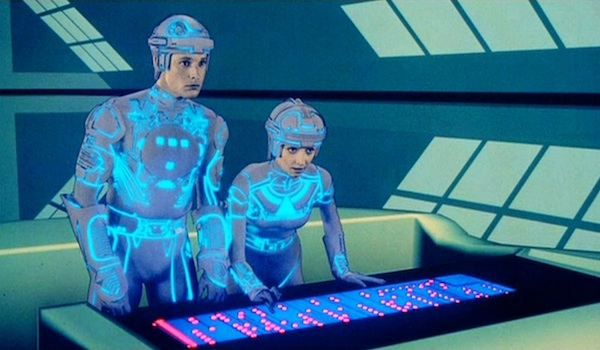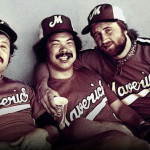TRON Review
TRON was hailed as revolutionary back in 1982, and even today, you can’t deny its technical achievements. While the film looks incredibly dated, few movies before it had ever relied so heavily on computer graphics. It’s easy to write the film off now because incredible advancements have been made, but its concept is brilliant—mirroring a real-life corporate struggle with the struggle of computer programs against an all-powerful machine—and the film’s nostalgic visual elements make it quite enjoyable. If only director Steven Lisberger had been able to maintain a steady pace, I’d be singing TRON’s praises, instead of calling it merely passable.
The film begins in the real world, where Kevin Flynn (Jeff Bridges) is trying to hack into the computer systems of his rival and former employer, Dillinger (David Warner). When the two still worked together, Flynn created a number of incredibly popular arcade programs, including “Space Paranoid,†but Dillinger stole them from him. He took all the credit, got promoted, fired Flynn, and hid the evidence deep in the memory of the seemingly impenetrable Master Control Program.
But Flynn is the best programmer around, and he tries his damndest to break into the MCP and steal the evidence. He’s assisted by two former colleagues, Lora (Cindy Morgan) and Alan (Bruce Boxleitner), who has developed a program, Tron, that’s independent of the MCP. When the three try to activate Tron, Kevin is accidently zapped with a laser, and he enters the computer world, where he meets Tron (Boxleitner) and joins him in a fight to destroy the MCP.
The majority of TRON takes place in the computer world, where programs share a special connection with their users (including physical appearance). We see Tron and Kevin compete against other programs in deadly games (which resemble the games Kevin himself created). We watch them escape from the clutches of Sark (Warner), the Darth Vader to the MCP’s emperor, on high-speed light bikes. And we see them meet and receive help from a female program, Yori (Morgan). Everything perfectly parallels the real world, which is quite interesting, at least for a while.
The problem with the film is that the narrative just doesn’t build any momentum. We are engaged while we are introduced to the computer world and the connections to the real world, but after the escape scene, the film settles into a rhythm that’s not very exciting and doesn’t try to build upon what we’ve already seen. It’s very front-loaded in this respect, and the longer the film goes on, the more it tests your patience.
The look of TRON is unlike anything we had seen to that point, and unlike almost anything we’ve seen since. This aspect of the film has, for better or worse, cemented the film’s place in history. It’s a bit laughable at first, but the neon colors and technical sounds end up being assets to the film. It’s very nostalgic.
The acting in TRON is so secondary that it’s hardly worth pointing out, but Jeff Bridges is great. He’s one of the most charismatic actors around, and he wasn’t much different as a youth. Kevin is an easy-to-root-for hero, and in both worlds, he commands our attention. The rest of the performances, with the exception of a small supporting performance by Barnard Hughes as a mentor figure to both Dillinger and Tron, are immediately forgettable.
Scott Pilgrim vs. The World recently did something very similar (but more successfully) to what TRON accomplishes. Both films incorporate elements of video games into the story and the visuals, and both are a hell of a lot of fun as a result. I didn’t like TRON quite as much as Edgar Wright’s film (mostly because it lags quite a bit as it goes on), but I still found it enjoyable, and I’m now definitely looking forward to the long-awaited sequel, TRON: Legacy, this December.
















